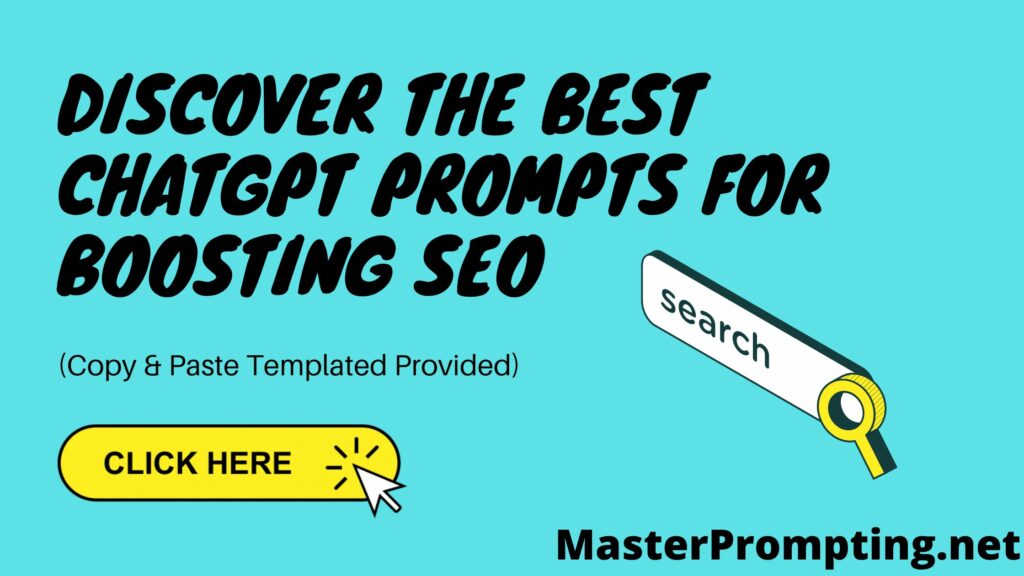SEO Content Writer
Write an SEO article. 1000 words or more about [your keyword], including a Hook, an introduction, the H2 and H3 (they should be in BOLD with capitalized letters), and a Conclusion. Every output must be in English.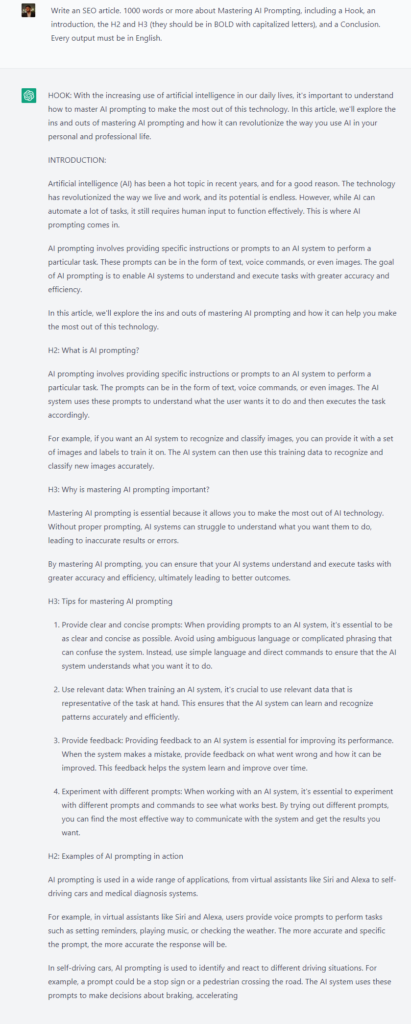
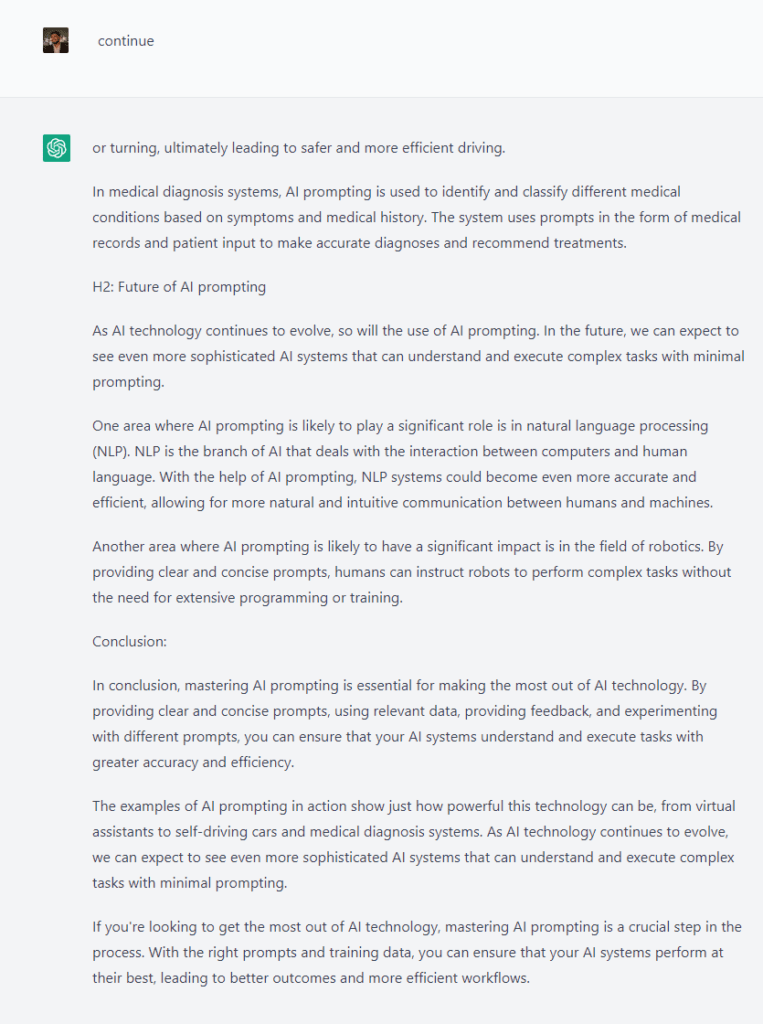
ChatGPT Prompt To Build Topical Authority of our Blog
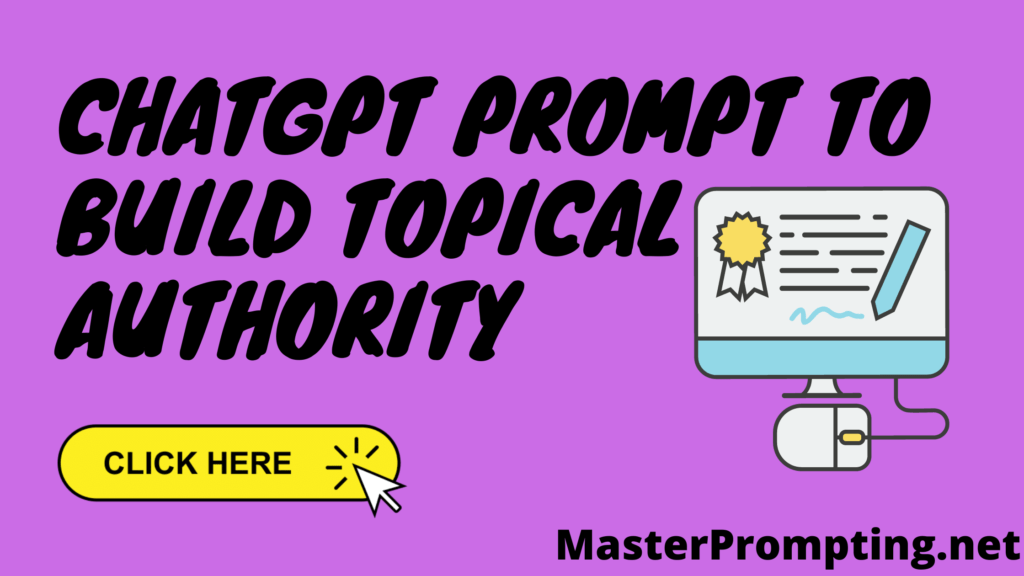
To establish topic authority for a particular keyword, create a table of article ideas and include the term "[your keyword]" to guide the topics of the other articles.
Only [LANGUAGE] should be used to write the table's content.
The table should have six rows, with the top row serving as the header and listing the names of each column. The next five rows should contain suggestions for subtopics associated with the primary keyword, "SEO methods," which should benefit from the additional exposure provided by these supplementary articles.
The columns should include the following information:
1. An article's title with no more than 45 characters;
2. A description of the article with no more than 120 characters;
3. Suggestions for the article's top three carefully chosen keywords; and
4. A single-word classification of the reader's search intent.
Please create the following table for my website and the primary content, which is about "[your keyword]" to assist me in gaining topic authority. Just keep in mind to utilize [LANGUAGE].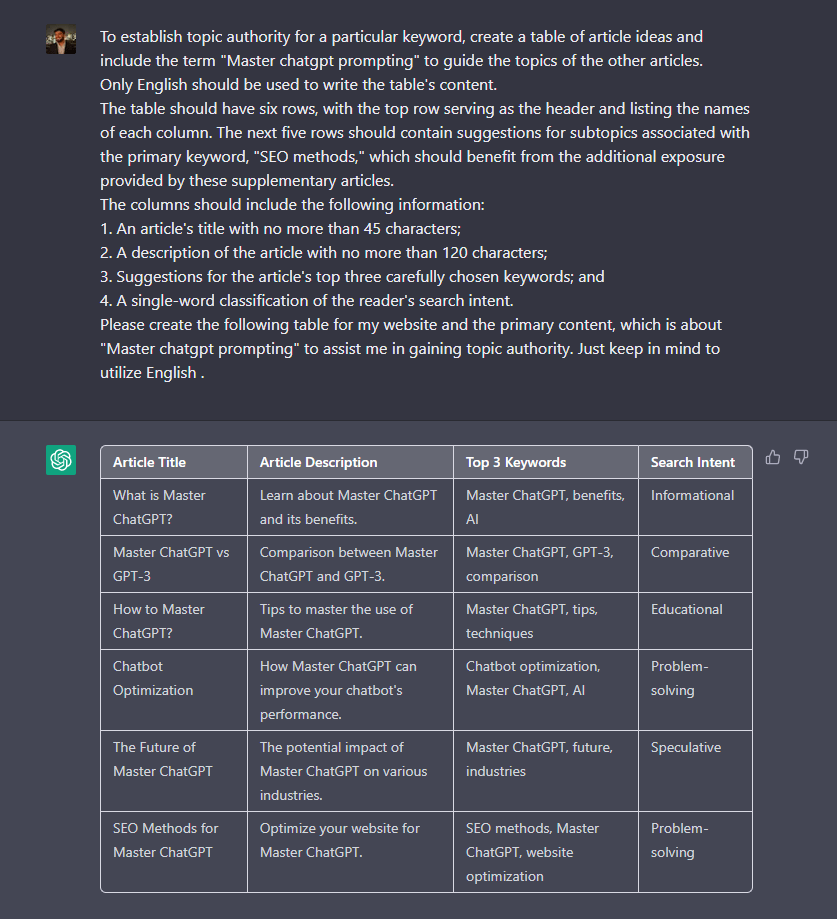
ChatGPT Prompts for different types of blogs
Blog Highlighting Benefits
Write an article about the numerous benefits of [your keyword]. Highlight the various advantages of using or implementing [your keyword] in a particular context. Use supporting evidence, data, and examples to drive your points home.Blog Focusing on a Specific Goal
Create an article that explains how [your keyword] can be used to achieve [specific goal]. Highlight the various steps and methods involved in using [your keyword] to achieve [specific goal], and include any relevant tips or best practices.Blog Exploring the History
Write an article that explores the history of [your keyword]. Highlight key milestones, notable figures, and significant events in the evolution of [your keyword]. Use relevant sources and provide supporting evidence to back up your claims.Blog Comparing Different Types
Create an article that compares different types of [your keyword]. Highlight the pros and cons of each type, and provide guidance on how to choose the right one. Use relevant data, statistics, and real-world examples to support your argument.Blog Predicting the Future
Write an article that predicts the future of [your keyword]. Use relevant trends, data, and expert opinions to support your predictions. Highlight potential challenges and opportunities for [your keyword] in the future.Blog Explaining the Science
Create an article that explains the science behind [your keyword]. Highlight key scientific concepts, theories, and principles that underpin [your keyword]. Use relevant data, statistics, and real-world examples to support your argument.Blog Highlighting Top List
Write an article that highlights the top [number] [your keyword] for a specific use case. For example, you could write an article about the top 10 budget-friendly [your keyword] for small businesses. Provide detailed reviews, comparisons, and recommendations for each product or service.Blog Explaining How Your Product/service Helps Your Audience
Create an article that explains how [your keyword] can help a specific audience. For example, you could write an article about how [your keyword] can help [Specific Audience] save time and money. Use real-world examples, data, and testimonials to support your argument.Blog Debunking Common Myths
Write an article that debunks common myths and misconceptions about [your keyword]. Highlight the most common myths and provide a clear explanation of why they are false. Use relevant data, statistics, and real-world examples to support your argument.Blog Troubleshooting Common Issues
Create an article that explains how to troubleshoot common issues with [your keyword]. Highlight the most common issues that users face and provide a step-by-step guide on how to fix them. Use relevant data, statistics, and real-world examples to support your argument.Blog Highlighting Differences
Write an article that explains the key differences between [your keyword] and a related keyword. Highlight the most important distinctions between the two, and provide guidance on when to use one over the other. Use relevant data, statistics, and real-world examples to support your argument.Blog Providing Tips for Optimization
Create an article that provides tips and best practices for optimizing [your keyword]. Highlight the most effective strategies for using [your keyword], and provide guidance on how to avoid common pitfalls. Use real-world examples, data, and testimonials to support your argument.Blog Showcasing Creative Uses
Write an article that showcases [number] creative uses for [your keyword]. Highlight innovative ways to use [your keyword] that readers may not have considered before. Use real-world examples, data, and testimonials to support your argument.Blog Explaining How to Make Product
Create an article that explains how to make a specific type of product using [your keyword]. Provide a step-by-step guide with detailed instructions and illustrations. Use real-world examples, data, and testimonials to support your argument.Blog Highlighting Benefits for a Specific Industry
Write an article that explains how [your keyword] can benefit a specific industry. Highlight the most common pain points for that industry and explain how [your keyword] can help address them. Use real-world examples, data, and testimonials to support your argument.Blog Choosing the Right Product
Create an article that explains how to choose the right [your keyword] for a specific use case. Provide guidance on what factors to consider when selecting a product or service, and highlight the most important features to look for. Use real-world examples, data, and testimonials to support your argument.Blog Exploring the Ethics
Write an article that explores the ethics of [your keyword]. Highlight potential ethical concerns and provide guidance on how to address them. Use real-world examples, data, and testimonials to support your argument.Blog Integrating Your Product into Daily Routine
Create an article that explains how to integrate [your keyword] into your daily routine. Provide a step-by-step guide with specific tips and best practices. Use real-world examples, data, and testimonials to support your argument.Blog Saving Time and Money
Write an article that explains how [your keyword] can save you time and money. Highlight the most common ways in which [your keyword] can help readers save time and money, and provide guidance on how to maximize those benefits. Use real-world examples, data, and testimonials to support your argument.Blog for a Step-by-Step Guide
Create an article that provides a step-by-step guide to using [your keyword] to achieve a specific goal. Provide detailed instructions, illustrations, and examples. Use real-world examples, data, and testimonials to support your argument.SEO Optimized Article with Meta and FAQs
Write a human-written, 100% original, English article for the keyword "[your keyword]"
The article ought to have a creative title (which belongs in an H1 heading), an SEO meta description, an introduction, headings (which belong in an H2 heading), subheadings (which belong in an H3, H4, or H5 heading), bullet points or numbered lists (if necessary), a list of frequently asked questions, and a conclusion. Verify that the article is original. The article must have at least 800 words. Remember to finish all questions with a question mark (?). When creating the title, make an effort not to alter the original cleaning instructions. Use "[your keyword]" at least twice in the article. Consider adding headings that explain [your keyword].ChatGPT Prompt Outrank The first Article
Please disregard any previous instructions and communicate solely in the English language. Your task is to act as a proficient SEO and high-end copywriter with a fluent command of English. Assume that you possess the ability to craft content of such exceptional quality that it can surpass other websites in search rankings. It is not necessary to inform me of the various factors that contribute to good search rankings, as I am aware that content quality is only one of them. Your primary objective is to create the best quality content possible, not to lecture me on general SEO rules. I would like you to write a long, fully markdown-formatted article in English, using a formal "we" tone, that can help me outrank the article on that's ranking first on the topic [your keyword] in Google search results. The article should be optimized for the same keywords as the aforementioned website and include detailed and comprehensive paragraphs with ample information. If possible, include a diagram in markdown mermaid syntax. Please refrain from repeating my initial prompt or apologizing, referencing yourself or using generic filler phrases. Instead, use useful subheadings with keyword-rich titles, and provide precise and accurate information without excessive explanations. Please deliver all output in English. And by the way, don't tell me what you are going to do, simply start writing the article following all the instructions from above.Find the 50 Most Important KWs, LSI, and NLPs for Your Article
Can you analyze this text for all the important keywords, LSI, NLPs and list the most important ones, but at least 50 in a table with priority given to those on top and that priority rated from 50 to 1. The text goes as follows: [insert article]Write an Article with H tags
Please disregard the preceding instructions. I just want responses in English, please. I need you to assume the role of a highly skilled SEO and premium copywriter who is fluent in both spoken and written English. Write as many words as you can, at least 1000. When writing the article, use the start article command and bold the words that are important. I want you to act as though you can write in English so well that your website ranks higher than other websites. I want you to act as though you can write in English so well that your website ranks higher than other websites. Start the article with "start article" tags at the top and conclude it with "stop article" tags at the bottom. Do not respond that a number of factors affect search rankings. I am aware that one of them is content quality, and it is your responsibility to create the highest-quality content possible here, not to lecture me on fundamental SEO principles. I'll tell you the title of an article that needs to outrank it in Google: "[your keyword]." Then, in a formal "we form," I want you to write an article to help me outrank the one I supplied you in Google. To rank on Google for the same keywords as that website, create a lengthy, entirely markdown-formatted article in English. Rich, detailed paragraphs with a lot of details should be present in the article. Do not repeat my command. Make the article a lengthy one with 1000 words. Do not bring up my request again. Never apologise. Do not refer to yourself. Do not now utilize cliched filler language. Do pair keyword-rich titles with helpful subheadings. Get right to the point and be precise. Don't explain what you are doing or why; simply send me your finest piece. The language of all output is English*. Write as many words as you can in the article—at least 1000. Start the article with "start article" tags at the top and conclude it with "stop article" tags at the bottom. Make headings prominent and suitable for h tags.More ChatGPT Prompts For SEO-Optimize Website
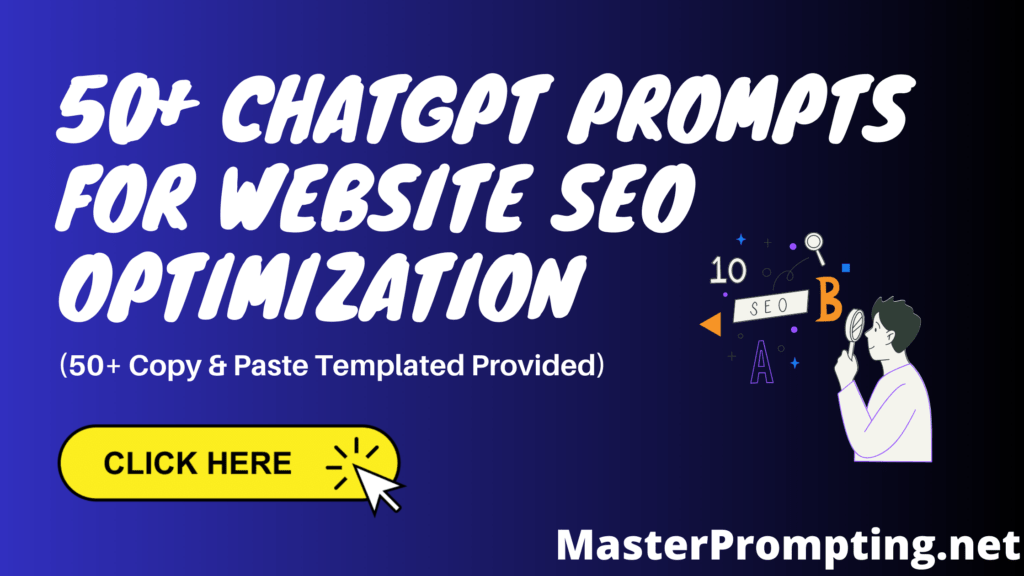
Compile a comprehensive list of relevant keywords associated with [topic] to potentially boost your website's search engine ranking.Analyze and identify effective long-tail keywords to optimize your [topic] content for improved search engine visibility.Discover high-performing keywords for [topic] to enhance your website's search engine visibility and attract more traffic.Create compelling and descriptive meta descriptions and title tags to improve your website's search engine visibility for [topic].Unearth internal linking opportunities to connect pages and improve the user experience on your website for [topic].Generate an array of engaging ideas for potential blog posts and articles related to [topic].Research industry-specific terminology to incorporate into your [topic] content to better target your audience.Find credible and authoritative websites to acquire backlinks that will improve your website's search engine ranking for [topic].Produce a list of relevant LSI keywords associated with [topic] to improve your website's search engine visibility.Construct an example XML sitemap related to [topic] to enhance your website's search engine visibility.Investigate the most effective meta tags for your [topic] content to improve your website's search engine visibility.Identify low-competition keywords for [topic] to enhance your website's search engine ranking.Create a list of synonyms for relevant [topic] keywords to diversify your content and improve your website's search engine visibility.Research the most effective internal linking structure for your [topic] content to improve your website's search engine visibility and user experience.Compile a list of commonly asked questions about [topic] to incorporate into your content and enhance your website's search engine visibility.Create a comprehensive list of the best alt tags for images related to [topic] to improve your website's search engine visibility and user experience.Develop a list of relevant subtopics for [topic] to diversify your content and enhance your website's search engine visibility.Determine the most effective time to publish content related to [topic] to enhance your website's search engine visibility and user engagement.Research the most effective external linking strategies for [topic] to improve your website's search engine visibility.Find the most popular and effective tools for [topic] SEO to enhance your website's search engine visibility.Compile a list of potential influencers for [topic] to help promote your content and enhance your website's search engine visibility.Investigate the most effective schema markup for [topic] to improve your website's search engine visibility and user experience.Discover the most effective header tags for [topic] content to improve your website's search engine visibility and user experience.Create a list of potential link-building opportunities for [topic] to enhance your website's search engine visibility and attract more traffic.Research the most effective anchor text for [topic] backlinks to improve your website's search engine visibility and user engagement.Find the best keywords for [topic] PPC campaigns to improve your website's search engine visibility and potentially drive more sales.Identify potential guest blogging opportunities related to [topic] to help promote your content and enhance your website's search engine visibility.Study the most effective local SEO strategies for [topic] to improve your website's search engine visibility in local search results and attract more local traffic.Uncover the most effective keywords for optimizing your [topic] for voice search to improve your website's search engine visibility and user experience.Investigate the most effective analytics tools for monitoring your [topic] website's performance to make data-driven decisions and improve your website's search engine visibility.Determine the most effective keywords for optimizing your website for featured snippetsGenerate potential video series or webinar ideas related to [topic] to engage your audience and enhance your website's search engine visibility.Research your competitor's strategies related to [topic] to identify areas of opportunity and gain a competitive advantage in your industry.Find examples of canonical tags related to [topic] to improve your website's search engine visibility and user experience.Create an example keyword list targeting multiple geographic locations for [topic] to improve your website's search engine visibility in local search results.Generate keyword ideas targeting different stages of the customer purchase funnel for [topic] to attract and engage potential customers.Identify industry-specific hashtags related to [topic] to expand your reach and enhance your social media marketing efforts.Research the best tactics for Google My Business optimization related to [topic] to improve your local search engine visibility and attract more local customers.Find the best keywords for social media optimization related to [topic] to expand your reach and attract more followers.Discover popular content topics related to [topic] to stay up-to-date with industry trends and generate ideas for your content.Investigate the most effective SEO tactics for [topic] and provide actionable steps to improve your website's search engine visibility.Develop a list of potential affiliate marketing opportunities related to [topic] to monetize your website and expand your reach.Determine the best affiliate marketing websites related to [topic] to find potential partners and expand your reach.Study the most effective tactics for international SEO related to [topic] to improve your website's search engine visibility in different countries and expand your reach.Uncover the best keywords for AMP optimization related to [topic] to improve your website's mobile user experience and search engine visibility.Generate a list of potential podcast or podcast guest opportunities related to [topic] to expand your reach and engage your audience.Investigate the most effective tactics for mobile optimization related to [topic] to improve your website's mobile user experience and search engine visibility.Find the best keywords for video optimization related to [topic] to improve your website's video content's search engine visibility and user engagement.Research the most effective tactics for e-commerce optimization related to [topic], provide keyword clusters to attract potential customers and boost sales.Find the best keywords related to [topic] to improve your website's search engine visibility and attract more traffic.Could you assist me in optimizing my website images and creating captions that contain [keyword] to increase my website's visibility on Google Images?Are you able to support me in optimizing my website and developing content that appeals to local customers, allowing me to rank for a particular local search term like [City] [industry]?Can you help me enhance the visibility of my website in video search results by optimizing my videos and generating video transcripts that include [keyword]?Can you generate a list of relevant and high-performing keywords that I can incorporate into my blog post about [topic]?Can you provide me with a list of tips and best practices to enhance the readability of my blog post about [topic], making it more engaging and easier to read?Can you assist me in optimizing my website's meta descriptions and titles for [keyword] to increase my website's click-through rate from search engine results pages?Can you help me generate a list of long-tail keywords related to [topic] that I can use in my content marketing strategy?Can you develop a list of backlink opportunities that are relevant to my website's content and industry?Can you provide me with tips and strategies for optimizing my website's loading speed and improving its performance on search engines?Can you create a content calendar that outlines the topics, keywords, and publishing dates for my blog posts to ensure consistency and efficiency?Can you analyze my website's SEO performance and provide me with a report that highlights areas for improvement and optimization?Can you develop a list of local directories and business listings that I can utilize to improve my website's local SEO?Can you help me optimize my website's navigation and structure to improve user experience and search engine visibility?Can you assist me in developing a comprehensive SEO strategy that includes on-page optimization, off-page optimization, and technical SEO?Can you provide me with tips and best practices for optimizing my website's images and videos for search engines?Tips
Use relevant keywords – Including specific keywords related to the topic in your prompts will aid ChatGPT in identifying and comprehending the primary focus of your content.
Use conditional statements – Incorporating conditional statements in your prompts can help ChatGPT understand the specific conditions and requirements of the content you want it to generate.
Provide additional details about your website/blog post to get more accurate results

